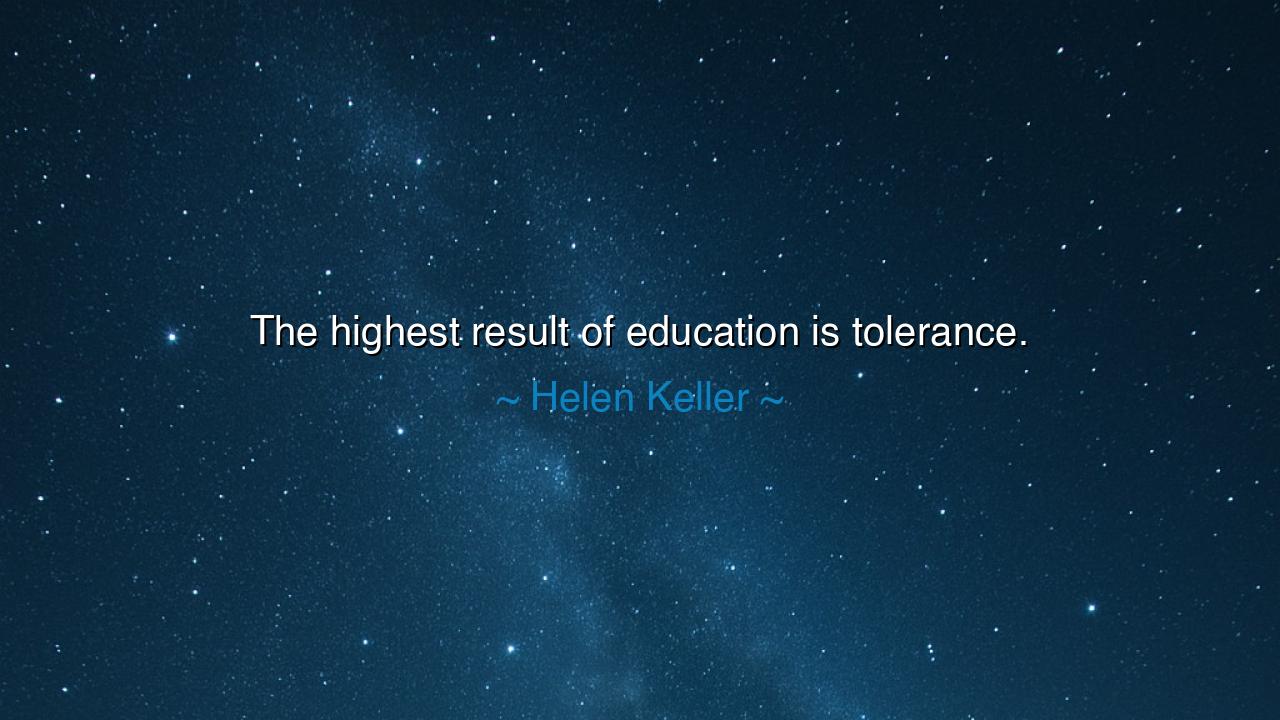
The highest result of education is tolerance.






“The highest result of education is tolerance.” Thus spoke Helen Keller, she who conquered silence and darkness, who transformed her own life of limitation into a beacon of wisdom for the world. Her words rise above the clamor of ordinary teachings and strike at the heart of what it means to be truly educated. For what profit is there in knowledge if it does not lead us to patience with our neighbors, compassion for the weak, and peace among the strong? To Helen Keller, who endured isolation and hardship, the purpose of education was not pride, nor power, but the cultivation of the soul’s nobility—its capacity for tolerance.
In her life, Keller knew that knowledge without love is cold, and reason without mercy is harsh. She declared that the pinnacle of learning is not found in laboratories, nor in libraries, but in the heart that learns to endure differences without hatred, to behold diversity without fear, and to embrace humanity in all its colors and forms. For tolerance is not weakness; it is the strength that restrains the hand of anger, the wisdom that sees beyond prejudice, and the patience that builds bridges where others would raise walls.
Consider the ancients, who taught that wisdom is harmony. Socrates endured ridicule without malice, Buddha taught compassion for all beings, and Christ forgave even those who crucified him. Each, in their own age, revealed that the highest fruit of enlightenment was not conquest, but tolerance. Keller’s words echo this eternal chorus: the mind may sharpen through study, but the soul is perfected only when it learns to bear with others in kindness.
History offers us a living example in the life of Mahatma Gandhi. He was trained in law, versed in philosophy, and disciplined in study, yet his greatness did not come from knowledge alone. It came from his profound tolerance—his willingness to resist injustice without violence, to stand firm without hatred, and to endure suffering without vengeance. Gandhi’s education was not only in books, but in the school of humanity, where patience and compassion became his greatest weapons. Through him, Keller’s truth is revealed: tolerance is the crown of learning, the highest result of education.
Yet how often is this truth forgotten? The educated sometimes grow arrogant, scorning those who know less, despising those who believe differently. Such arrogance is not wisdom but folly, for it divides rather than unites. A society rich in knowledge but poor in tolerance will soon devour itself, as pride hardens into hatred and learning becomes a tool of domination. The true measure of education is not how much one knows, but how deeply one understands and respects the humanity of others.
What lesson, then, shall we take from Keller’s words? It is this: pursue knowledge with zeal, but let it make you humble. Debate fiercely, but never with cruelty. Hold convictions firmly, yet leave space for others to walk their path. Parents, teach your children not only to read and count, but also to honor those who are different. Teachers, do not only impart facts, but shape hearts toward patience and understanding. Citizens, remember that the strength of a nation lies not only in its achievements, but in the tolerance that allows all its people to live as one.
So let us resolve to live out Keller’s teaching: “The highest result of education is tolerance.” For in tolerance lies the seed of peace, the root of justice, and the flower of true wisdom. When we learn to see beyond ourselves, when we embrace differences not as threats but as treasures, then education has achieved its greatest work. And so I say to you: seek knowledge, yes, but above all, let that knowledge teach you to love. For in the end, it is not brilliance that saves the world, but tolerance, born of wisdom and crowned with compassion.






AAdministratorAdministrator
Welcome, honored guests. Please leave a comment, we will respond soon